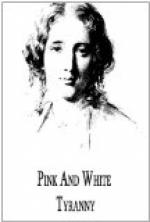No, she did not say it. It would be well for us all if we did put into words, plain and explicit, many instinctive resolves and purposes that arise in our hearts, and which, for want of being so expressed, influence us undetected and unchallenged. If we would say out boldly, “I don’t care for right or wrong, or good or evil, or anybody’s rights or anybody’s happiness, or the general good, or God himself,—all I care for, or feel the least interest in, is to have a good time myself, and I mean to do it, come what may,”—we should be only expressing a feeling which often lies in the dark back-room of the human heart; and saying it might alarm us from the drugged sleep of life. It might rouse us to shake off the slow, creeping paralysis of selfishness and sin before it is for ever too late.
But Lillie was a creature who had lost the power of self-knowledge. She was, my dear sir, what you suppose the true woman to be,—a bundle of blind instincts; and among these the strongest was that of property in her husband, and power over him. She had lived in her power over men; it was her field of ambition. She knew them thoroughly. Women are called ivy; and the ivy has a hundred little fingers in every inch of its length, that strike at every flaw and crack and weak place in the strong wall they mean to overgrow; and so had Lillie. She saw, at a glance, that the sober, thoughtful, Christian life of Springdale was wholly opposed to the life she wanted to lead, and in which John was to be her instrument. She saw that, if such women as Grace and Rose had power with him, she should not have; and her husband should be hers alone. He should do her will, and be her subject,—so she thought, smiling at herself as she looked in the looking-glass, and then curled herself peacefully and languidly down in the corner of the sofa, and drew forth the French novel that was her usual Sunday companion.
Lillie liked French novels. There was an atmosphere of things in them that suited her. The young married women had lovers and admirers; and there was the constant stimulus of being courted and adored, under the safe protection of a good-natured “mari.”
In France, the flirting is all done after marriage, and the young girl looks forward to it as her introduction to a career of conquest. In America, so great is our democratic liberality, that we think of uniting the two systems. We are getting on in that way fast. A knowledge of French is beginning to be considered as the pearl of great price, to gain which, all else must be sold. The girls must go to the French theatre, and be stared at by French debauchees, who laugh at them while they pretend they understand what, thank Heaven, they cannot. Then we are to have series of French novels, carefully translated, and puffed and praised even by the religious press, written by the corps of French female reformers, which will show them exactly how the naughty French women manage their cards; so that, by and by, we shall have the latest phase of eclecticism,—the union of American and French manners. The girl will flirt till twenty a l’Americaine, and then marry and flirt till forty a la Francaise. This was about Lillie’s plan of life. Could she hope to carry it out in Springdale?




